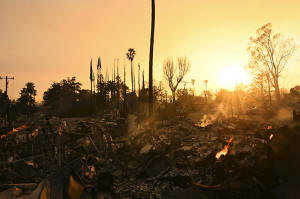What ignited the deadly California wildfires? Investigators consider an
array of possibilities
 Send a link to a friend
Send a link to a friend
 [January 13, 2025]
By JASON DEAREN [January 13, 2025]
By JASON DEAREN
LOS ANGELES (AP) — Investigators are considering an array of possible
ignition sources for the huge fires that have killed at least 24 people
and destroyed thousands of homes and businesses in the Los Angeles area.
In hilly, upscale Pacific Palisades, home to Hollywood stars like Jamie
Lee Curtis and Billy Crystal who lost houses in the fire, officials have
placed the origin of the wind-whipped blaze behind a home on Piedra
Morada Drive, which sits above a densely wooded arroyo.
While lightning is the most common source of fires in the U.S.,
according to the National Fire Protection Association, investigators
were able to rule that out quickly. There were no reports of lightning
in the Palisades area or the terrain around the Eaton Fire, which
started in east Los Angeles County and has also destroyed hundreds of
homes.
The next two most common causes: fires intentionally set, and those
sparked by utility lines.
John Lentini, owner of Scientific Fire Analysis in Florida, who has
investigated large fires in California including the Oakland Hills Fire
in 1991, said the size and scope of the blaze doesn’t change the
approach to finding out what caused it.
“This was once a small fire,” Lentini said. “People will focus on where
the fire started, determine the origin and look around the origin and
determine the cause.”

So far there has been no official indication of arson in either blaze,
and utility lines have not yet been identified as a cause either.
Utilities are required to report to the California Public Utilities
Commission when they know of “electric incidents potentially associated
with a wildfire,” Terrie Prosper, the commission's communications
director, said via email. CPUC staff then investigate to see if there
were violations of state law.
The 2017 Thomas Fire, one of the largest fires in state history, was
sparked by Southern California Edison power lines that came into contact
during high wind, investigators determined. The blaze killed two people
and charred more than 440 square miles (1,140 square kilometers).
[to top of second column]
|

The sun sets over damage from the Eaton Fire, Thursday, Jan. 9,
2025, in Altadena, Calif. (AP Photo/Nic Coury)

On Friday, Southern California Edison filed a report with the CPUC
related to the Eaton Fire in the hills near Pasadena, an area the
utility serves.
Edison said it has not received any suggestions that its equipment
was involved in the ignition of that fire, but that it filed the
report with state utilities regulators out of “an abundance of
caution” after receiving evidence preservation notices from
insurance company lawyers.
“Preliminary analysis by SCE of electrical circuit information for
the energized transmission lines going through the area for 12 hours
prior to the reported start time of the fire shows no interruptions
or electrical or operational anomalies until more than one hour
after the reported start time of the fire,” the utility reported.
While lightning, arson and utility lines are the most common causes,
debris burning and fireworks are also common causes.
But fires are incited by myriad sources, including accidents.
In 2021, a couple's gender reveal stunt started a large fire that
torched close to 36 square miles (about 90 square kilometers) of
terrain, destroyed five homes and 15 other buildings and claimed the
life of a firefighter, Charlie Morton.
The Eaton and Palisades fires were still burning with little
containment on Friday. Winds softened, but there was no rain in the
forecast as the flames moved through miles of dry landscape.
“It’s going to go out when it runs out of fuel, or when the weather
stops,” Lentini said. “They’re not going to put that thing out until
it’s ready to go out.”
All contents © copyright 2024 Associated Press. All rights reserved
 |